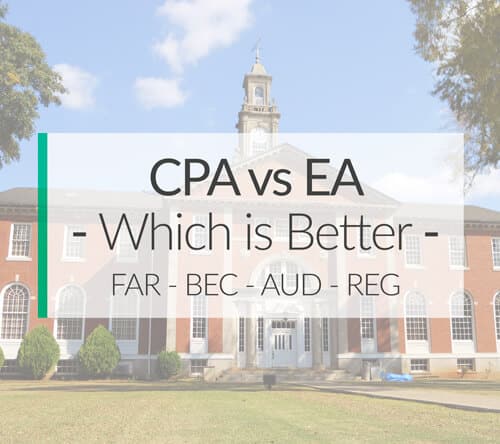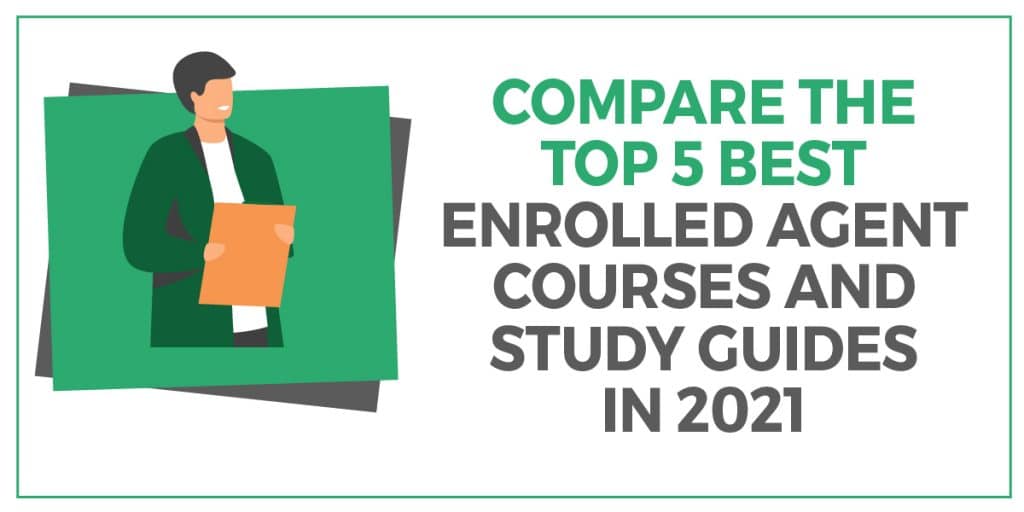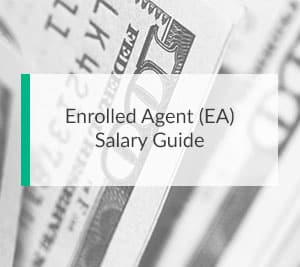An Enrolled Agent (EA) is a tax practitioner who is federally licensed and is able to represent taxpayers during IRS cases that involve collections, audits, and appeals. It is the highest IRS-awarded credential.
Individuals who obtain the EA certification must closely adhere to strict standards of ethics and complete 72 hours of CPE courses every three years. According to the IRS, enrolled agents have unlimited practice rights; they have no restrictions on which taxpayers they represent or tax matters they can handle.
EA status is recognized in all 50 U.S. states. An enrolled agent fulfills a similar role to attorneys and CPAs, but are much more specialized. Unlike state licensed CPAs and attorneys, all enrolled agents specialize in taxation.

What Does An Enrolled Agent Do?
Enrolled agents exist to represent taxpayers before the IRS at all administrative levels up to, but not including, Tax Court. The only EAs allowed to argue cases in Tax Court are those who have passed the “Tax Court Exam For Non-Attorneys”.
Many EAs compete with CPAs and other types of accountants. As an EA, you can help clients with tax returns as well as advise on any tax related concerns. You will also use your expertise to represent clients who need to deal with the IRS in any capacity, such as during an audit.
Because the EA credential is a federal designation, enrolled agents can operate across state borders. Consequently, this gives them more freedom in where they work since they don’t have to meet reciprocity requirements in whatever state they move to.

How Can You Earn The EA Credential?
Becoming a licensed Enrolled Agent is a difficult process that can take several years of dedication. There are two different ways to do so:
Online Examination
For ten months out of the year (May to February of the next year) Prometric administers an online EA exam known as the Special Enrollment Exam (SEE). The SEE is in three parts; each part may be taken up to four times a year. Completion of any given part lasts for two years before you must attempt it again.
There are no education or experience requirements to taking the SEE. What counts most for an Enrolled Agent is that they possess knowledge of US tax code, which you can prove by passing the test itself.
To fully follow this track to becoming an EA, there are a few steps you must follow:
- Obtain a Preparer Tax Identification Number (PTIN)
- Visit Prometric’s SEE web page to schedule test appointments as well as view test prep materials.
- Pass all parts of the test within two years.
- Apply for enrollment and either pay online or mail a check with a completed Form 23 to the IRS.
- Pass a suitability check that ensures you are tax-compliant, that you have filed all necessary tax returns, and that you pass a criminal background check.
Once you have managed to successfully complete all of the above steps, you will have become an Enrolled Agent!

IRS Experience
You can also become an EA via possessing past experience and technical expertise with the IRS. To follow this track you must complete the steps below:
- Work five years for the IRS in a position requiring knowledge and interpretation of the tax code.
- Apply for and submit enrollment Form 23
- Pass a suitability check that ensures you are tax compliant, that you have filed all necessary tax returns, and that you pass a criminal background check.
This track is much easier, but it does require a minimum of five years of dedication. Consequently, some prefer this track due to the experience and knowledge working with the IRS gives you.

What Can I Expect On The SEE?
The SEE is a three part exam covering everything an Enrolled Agent needs to know in their line of work. A description of each part and how their grades are weighted can be seen below.
Keep reading to learn more about the SEE:
| Test Part | Subtopic 1 | Subtopic 2 | Subtopic 3 | Subtopic 4 | Subtopic 5 |
| Part 1: Individuals | Preliminary Work and Tax Payer Data (17 Questions) | Income and Assets (21 Questions) | Deductions and Credits (21 Questions) | Taxation and Advice (14 Questions) | Specialized Returns for Individuals (12 Questions) |
| Part 2: Businesses | Business Entities (28 Questions) | Business Financial Information (39 Questions) | Specialized Returns and Tax Payers (18 Questions) | ||
| Part 3: Representation, Practices, and Procedures | Practices and Procedures (25 Questions) | Representation before the IRS (24 Questions) | Specific Types of Representation (19 Questions) | Completion of the Filing Process (17 Questions) |
Source: Fast Forward Academy
The exam itself consists of multiple choice questions designed to test EA-related knowledge and skills. All of the questions are weighted equally and the IRS grades the test on a bell curve. Test results are then converted to a scale from 40-130, with 105 being the lowest passing score. Exam results are seen right after completing the exam.
Each part of the exam is 100 questions; you have 3½ hours to answer the questions for each part. Individual parts are tested as separate exams and all parts must be completed within two years or you’ll have to start over.
How Much Does The Enrolled Agent Exam Cost?
Each part of the EA exam will cost $109, paid when you schedule the exam. If you need to schedule your exam, it is free so long as you do so more than 30 days in advance. Rescheduling between 5 to 29 days prior to the exam costs $35, and rescheduling within $5 means you will have to pay the full fee again.
Maintaining Your EA Credentials
Enrolled agents renew on a staggered schedule that is based off of the last digit of their social security number. In order to renew your credential, you will have to complete 72 hours of continuing education (CE) courses every three years, with a minimum of 16 hours a year. Furthermore, two of those hours per year must be in ethics.
If your initial enrollment starts during an enrollment cycle, you will instead be required to complete two hours of CE per month until the end of the enrollment year and one two-hour ethics course. When your next enrollment cycle begins you will return to the standard requirements.
EA Careers
Once you’ve passed the exam, you can now freely represent taxpayers in front of the IRS! As an EA there are typically three levels at which you can earn a salary: entry-level, mid-level, and senior. Entry-level Enrolled Agents tend to make between $28,000 to $61,000. Mid-level employees can expect a salary between $32,000 and $74,000. Finally, senior Enrolled Agents can expect to make between $66,000 and $127,000 annually.
Entry-level Enrolled Agents will mainly be expected to work as tax practitioners. They will be expect to prepare tax returns for businesses and individuals. Mid-level employees will be asked to follow up tax invoices, prepare bank reconciliations, provide information to auditors, and more. Finally, senior Enrolled Agents will be asked to do all of the above and team up with other departments to hash out tax issues.
If that all sounds appealing to you, here’s the good news:
Demand for Enrolled Agents is slowly growing, meaning an increase in EA-related career availability. Therefore, I recommended checking out local salary information on Indeed to see how much you can expect to make in your area.
Why Choose EA Over CPA?
Although CPAs have a more predictable career and salary, the demand for EAs is growing faster than that for CPAs. EAs also tend to have a more flexible schedule, which is nice for people with families. They also tend to work independently instead of in an office, which may be more attractive to someone who doesn’t like a confined office environment.
Becoming an EA is also much less work than becoming a CPA. You only have to pass the exam to earn the certification, rather than work to meet a bunch of prerequisites.
In terms of salary, entry level EAs earn less than CPAs. However, if you can stick with it until you reach a senior position, your salary can rival that of a CPA. It takes longer to pay off, but it is well worth your time to become an Enrolled Agent!
The Bottom Line
Earning the EA credential is a valuable way to spend your time. It’s one of a very few number of credentials that does not have an education requirement and both methods of earning it have advantages. Additionally, passing the exam dramatically cuts down on the amount of time it takes to become certified and can land you a well-paying job quickly. Alternatively, becoming an Enrolled Agent via work experience grants valuable experience that will not only help you perform better as an EA but also looks good on a resume.
If you’re a recent college graduate or clerical staff for an accounting firm, consider taking the EA exam. College students will still be used to taking exams and clerical staff know a lot about taxation through their work. Both would make excellent candidates for the exam; furthermore, there are many excellent educational resources and prep courses available for interested students.. Passing this exam will help your career path and make your resume look more attractive to employers.
So if you’re looking to move up in the world, there’s no better time than now to become an EA!











